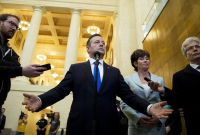Premier Jason Kenney's United Conservative Party government introduced its first piece on legislation on Wednesday, proposing to scrap the province’s carbon tax and raising the stakes in its fight with the federal Liberal government over climate action.
The tabling of Bill 1, An Act to Repeal the Carbon Tax, fulfilled a key election promise for Kenney, who led the United Conservative Party to a majority victory in an election last month.
“We campaigned on scrapping the job-killing carbon tax and Albertans responded loud and clear,” Kenney said in a statement.
“We’re keeping our commitment to eliminate this tax grab to create jobs and put more money back into the pockets of hard-working Albertans.”
Carbon tax introduced to fight the climate crisis
Former NDP premier Rachel Notley introduced the carbon tax as part of a plan to address the climate crisis, which threatens to cause severe damage to the Earth's ecosystems as well as to the global economy. Scientists say that the climate crisis will increase the frequency and severity of deadly extreme weather events such as floods, wildfires and heatwaves, but that some of the worst impacts of this crisis can be averted if countries take aggressive action over the next decade.
Canadian government scientists say the world needs to reduce heat-trapping greenhouse gas emissions to "near zero" by the second half of the century in order to limit the most severe consequences of climate change.
Kenney's government said in its throne speech on Wednesday that it would tackle climate change through new regulations and the introduction of a technology fund that would be used to reduce greenhouse gases.
In the legislature, Kenney said the carbon levy was "all economic pain and no environmental gain.”
Referring to the costs typical families and small businesses would save, Kenney said: “This is important tax relief. Albertans have been waiting for this relief.”
That sentiment was echoed by groups representing taxpayers and small businesses.
“The carbon tax has hit Alberta’s small business community hard over the past two and a half years," said Richard Truscott, vice-president of the Canadian Federation of Independent Business. "It added big new costs for entrepreneurs and drained billions out of consumers’ pockets in the midst of an incredibly challenging economy."
Franco Terrazzano, the Alberta director of Canadian Taxpayers Federation, said he was glad it was gone.
"This tax was never voted on, never received public buy-in and hammered Alberta families and businesses during tough economic times," he said in a statement. "It's good to see this government scrap the tax that should have never been imposed in the first place."
Kenney said during the election campaign that Notley's price on carbon was a tax grab that punished consumers without any environmental benefits, echoing arguments used previously by other Conservative politicians such as former prime minister Stephen Harper as well as by conservative governments in Ontario and Saskatchewan.
Kenney also argued that the NDP plan was harming Alberta's economy.
But killing the provincial pricing mechanism for pollution means Prime Minister Justin Trudeau will likely insist on imposing Ottawa's own "backstop" tax on the oil-producing province's emissions, which Kenney's attorney general is then expected to challenge in court.
The Kenney government claims scrapping the provincial carbon tax will free up nearly $1.4 billion of tax burden, create 6,000 jobs, save the average small business $4,500 annually and save Alberta families up to $1,150 a year.
Saskatchewan Court said feds have power to fight climate 'emergency'
If passed, the legislation will come into force at 12:01 a.m. on May 30 — meaning the price on carbon, which is charged on gasoline as well as on fossil fuels used in home heating, could have little more than a week to live.
If it does die, that opens the door to a federal price on carbon being imposed, something that has already happened in Ontario, New Brunswick, Manitoba and Saskatchewan, which refused to do it themselves.
Kenney's party had also participated in court challenges of the federal carbon pricing plan and suggested that a UCP government would join the legal action.
However, in a setback to the conservative challenge, the Saskatchewan Court of Appeal rejected these challenges and ruled in a 3-2 decision that the federal plan was constitutional.
Kenney said last week that the government wanted to review the court decision as well as an upcoming decision in Ontario before deciding whether it will launch its own legal challenge in Alberta.
Two other provinces led by conservative premiers, New Brunswick and Manitoba, are also challenging the federal plan in the court.
Calling climate change “an emergency” and a “genuine threat to Canada,” the Saskatchewan Court of Appeal made clear it’s not something provinces can tackle on their own.
“Climate change is a global problem and, accordingly, it calls for a global response. Such a response can only be effectively developed internationally by way of state-to-state negotiation and agreement,” Chief Justice Robert Richards wrote in his 155-page decision.
In making international commitments to the targets under the 2015 Paris Agreement, Canada is expected to make national commitments with respect to greenhouse gas reductions and mitigation targets.
“Those commitments are self-evidently difficult for Canada, as a country, to meet if not all provincial jurisdictions are prepared to implement GHG emissions pricing regimes — regimes that, on the basis of the record before the Court, are an essential aspect of successful GHG mitigation plans,” Richards said.
The federal regime came into force in June of 2018. The federal carbon price in provinces that do not have one of their own starts at a minimum of $20 a tonne and is to rise $10 each year until 2022.
No word on green programs funded by levy
Alberta’s carbon levy was first introduced as part of an omnibus bill in May 2016 — the Climate Leadership Implementation Act — which created two new statutes: the Climate Leadership Act, establishing the carbon levy for fuel consumption, and the Energy Efficiency Alberta Act, which created a Crown corporation to design and deliver renewable energy and energy conservation systems.
It also amended the Alberta Corporate Tax Act, the Alberta Personal Income Tax Act and the Climate Change and Emissions Management Act.
At a technical briefing Wednesday, government officials said the new legislation only impacts the Climate Leadership Act, which will do away with the price on carbon.
They declined to answer questions about what that means for the rebates issued under Energy Efficiency Alberta for everything from light bulbs to home improvements, which were funded by revenues from the carbon levy, stating only that more details would come in the provincial budget.
The province collected $1.3 billion annually from the carbon levy, and any remaining revenue collected from this point on will go to the province’s general revenues, they said.
Officials were also asked how doing away with the levy will create the 6,000 jobs the province claims it will. Eliminating the price on carbon leaves more money for households and businesses to spend, they said, insisting “it adds up.”
The carbon levy cost the average small business about $4,500, according to the provincial government's calculations.
“You think that will create jobs?” one reporter asked. “Is that what you expect people to get paid?”
The legislation does not impact the province’s large emitters program.
Editor's note: This article was updated at 5:13 pm Mountain Time to include more detail from a technical briefing and at 5:24 pm to include comment from small business and taxpayer lobby groups.





Comments
Conservatives are just a bunch of Neanderthals.
They are all Morons. Never a Conservative.
Truly. I cannot stand this guy. Unsupportable bullshit that he peddles. Would it kill him to just work with fed govt?? He is going to destroy this province.
Well, you can't accuse the bastard of not practicing what he preaches. My wife was commenting that she wishes progressive governments would be as decisive.